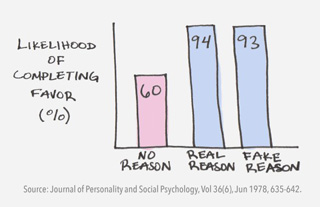
I found the chart above to be fascinating and true for major gifts, which is why I wanted to pass it on to you.
First a little background. (I am taking much of this material from a blog by James Clear.) In 1977 a psychologist, Ellen Langer, and her research team at Harvard University conducted a survey. Langer asked her research assistants to cut in front of innocent people waiting in line at the photocopiers in the library.
Here is how the study worked…
A researcher would spot someone waiting at the library copy machine and walk over with the intention of cutting in front of the person in line. Then, the researcher would look at the innocent bystander and ask him one of three questions.
- Version 1 (request only): “Excuse me, I have 5 pages. May I use the Xerox machine?”
- Version 2 (request with a real reason): “Excuse me, I have 5 pages. May I use the Xerox machine, because I’m in a rush?”
- Version 3 (request with a fake reason): “Excuse me, I have 5 pages. May I use the Xerox machine, because I have to make copies?”
You’ll notice that Version 3 didn’t make much sense. Using the phrase “because I have to make copies” was a fairly useless reason for skipping the line. Everyone waiting at the photocopier needed to make copies. The phrase contained no new information, but the researcher was trying to use it to justify the favor anyway.
Surprisingly, this senseless reason performed well. When the researchers analyzed the data, they found the following.
- Version 1: 60% of people let the researcher skip the line.
- Version 2: 94% of people let the researcher skip ahead in line.
- Version 3: 93% of people let the researcher skip ahead in line.
Langer’s research, which soon became known as “The Copy Machine Study,” was published in the Journal of Personality and Social Psychology.
The study became famous because it uncovered one of the most powerful words we use to drive our behavior: because. Langer’s work proved that as long as we could justify a behavior in our brains (“I’m doing this because…”), we would perform the behavior even if the reason didn’t make sense.
In his best-selling book, Influence, Robert Cialdini explained this phenomenon by saying, “A well-known principle of human behavior says that when we ask someone to do us a favor, we will be more successful if we provide a reason. People simply like to have reasons for what they do.”
People simply like to have reasons for what they do. Even a fake reason will do. But of course, you and I would not do that.
This simple concept is so powerful. And it demands that we examine our “becauses.”
Take a look at the “because” in all of your asks and proposals. First of all, be sure to take out any of the fake stuff. Here’s why I say that. In more instances than you want to know, Jeff and I encounter fake material in the asks and proposals of MGOs. This situation is not driven by a MGO who is dishonest, although I am sure there are a few here and there. It is mostly because the MGO has not been given anything to say or “sell.” And so they have to make stuff up.
Several months ago, I was reviewing a proposal that a good MGO had prepared. From the knowledge that I had about the program, it seemed that the copy I was reading was a little bit exuberant – a little over the top – a little unbelievable. So I asked: “Is all of this really true?” And he replied: “Well most of it is. I mean it really is a composite of different situations in program. Well (pointing to one part), this part I made up. I had to. I could not get the material from program.”
According to the copy machine study, this fake messaging would have worked. (You know it would have.) But you can’t do that – I know you know that. But I am digressing here – back to the word “because.”
Examine all of your asks and proposals in the next week or so, and look at the “because” in each of them. Does your “because” have something to do with solving a societal problem? If not, you are on the wrong track. If your “because” is about your organization or some cool idea that has nothing to do with a societal problem (I include the planet, animals and the environment in here), then the organization is self-expressing, rather than asking the donor to do something meaningful.
This one word, used correctly and followed by a solid explanation of how a donor’s giving will solve a problem and change things, will help you succeed as a MGO.
Richard




0 Comments